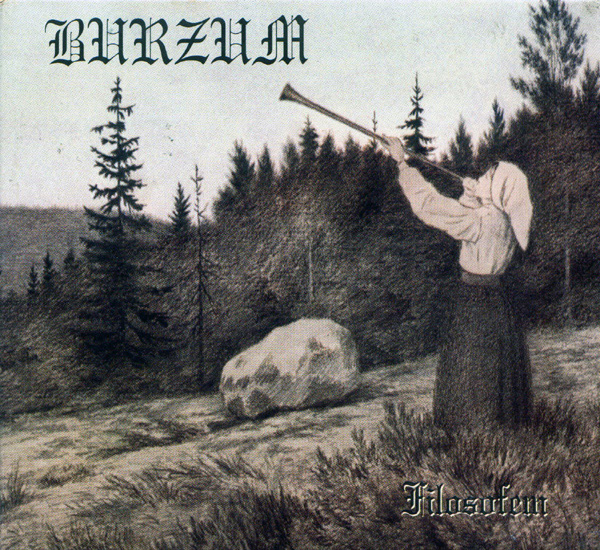Ok, this is a tricky one for me - probably for obvious reasons if you know the history of the artist behind it. I will explore this a bit further in a minute. First, I want to take a look at what compelled me to eventually write this review: the music.
When I discovered this album (and Black Metal in general) in the early 2000s, stuff like Rammstein, Marilyn Manson and some other goth metal bands were probably the hardest and darkest music I was aware of (it was a more innocent age, you know) and hearing stuff like this for the first time was in a way repelling, I admit. Yet... fascinating.
Especially so Filosoferm. The harshness of the sound, the unconventional, hypnotically repetitiveness of the tracks - for me there wasn't anything like that really. Metal is usually a relatively conventional genre and hearing it stripped down to its bare bones, then slowed down and combined with ambient-elements you would usually expect in much kinder works, was quite an eye-opening experience to me. The album simply worked. Even if it combined on first glance quite contradictory extremes.
And these extremes could hardly be starker. It starts with the song "Dunkelheit" (=Darkness). With guitars drenched in snow-storm like white noise, distorted vocals about darkness and death and monotonous drums working steadily through the songs, while on the other end of the spectrum there is a track like the 25 minute long "Circumambulation of the Transcendental Columns of Singularity" (I spare you the german version of its name), which consists basically of an almost shy, minimalistic electronic beat and some ambient sounds; giving it a dreamlike quality. Really impressive how so much atmosphere is created by so little and how well these two extremes blend.
Groundbreaking albums often start to sound dated with time. The novelty they introduce gets picked up by others, developed and refined further, making the initial innovation appear... unfinished or even obsolete. But not in this case: Filosoferm hasn't lost anything of its impact. It sounds truly timeless; maybe because it defied following any trend or convention, but rather a concept.
As much I like this album though, as much I am repelled by its creator and his sick, neo-nazi ideology and this is the very core of the contradicting feelings I had towards this album for a long time (years in fact), and the very reason why I barely listened to it until recently.
Eventually, I made my peace with it and began to separate it mentally from its artist. For a good part because it is about emotion and conveying moods and not about propagating ideology.
Also, to me, the artists aren't as important as the art they create. Humans can be quite mundane and petty, whether they get idolised or not. Yet, with all their human flaws, they at the same time can create incredibly impactful pieces of art. And maybe they do it because they are tortured souls in one way or another, not in spite of. Just think of people like Franciso Goya, Richard Wagner or Francis Bacon. The people are long gone, but their creations will last.
I also sense some genuine ambivalence within the whole Black Metal aesthetics. No doubt the music is a genuine expression of anger, fear and frustration. That's exactly what makes it so strong. The stark black-and-white aesthetics of the album covers (sadly not on Filosoferm) also has undeniable power. At the same time, corpsepaint, spikes, medieval weapons and all these accessories, are in my eyes quite juvenile ways of dressing up to appear "evil", which can devalue the earnest of what they actually want to say and therefore not the best call aesthetically.
The same applies for the choice of names from Tolkien's Ork-language (like Burzum). Sure, in the 90's Tolkien was less present in the mainstream as it is since the Peter-Jackson-films, yet again - the whole idea just doesn't fits quite right. It's actually quite kitschy. And probably was already back in the 90's.
Recent artists though seem to have found a more suitable stylistic approach. A great example is Myrkur, who uses pagan- and nature-inspired imagery so coherently and with such impact, without overdoing it and making it a "show". Musically though, I don't think artists like this would do the music they are doing without albums like Filosoferm. Like other milestones in music, it opened the door into a strange, new world for others to explore.


Keine Kommentare:
Kommentar veröffentlichen